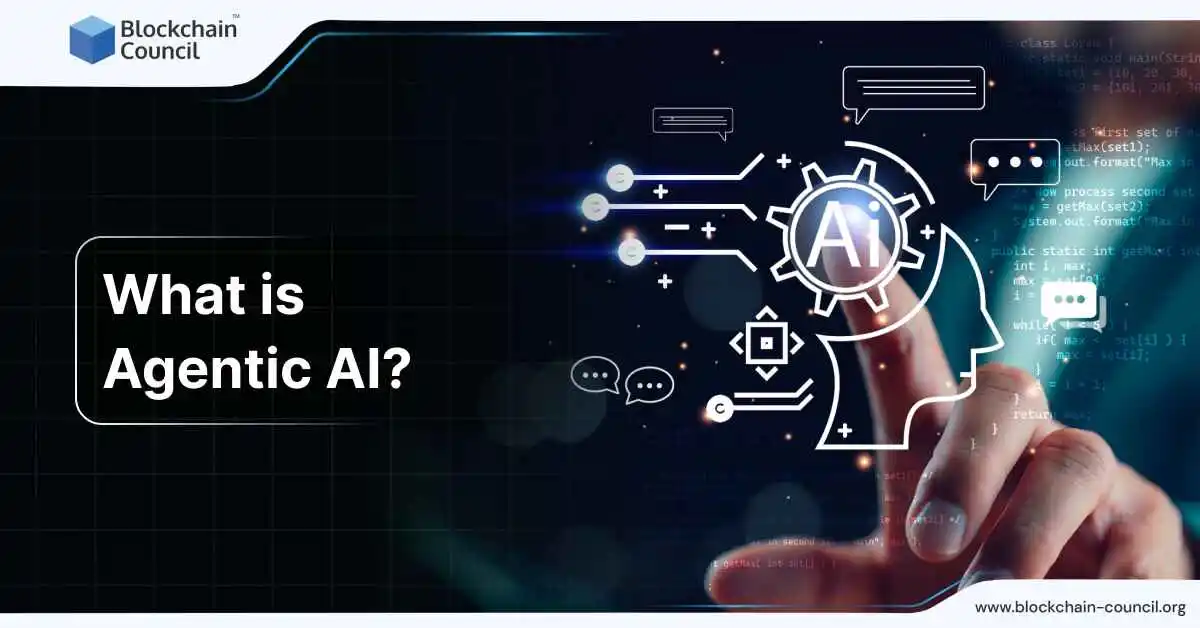
- Blockchain Council
- February 07, 2025
Artificial Intelligence (AI) has come a long way. It started with simple rule-based systems, but now, we see intelligent programs making decisions on their own. A major step in this journey is Agentic AI, a term used for systems that independently handle complex tasks with little direct human input. These AI models work towards set goals, executing workflows efficiently without constant supervision.
What is Agentic AI?
Agentic AI refers to programs that carry out specific actions without needing continuous instructions. These digital agents take in information, analyze real-time data, and execute tasks with different levels of human involvement. They work fast, making processes smoother by narrowing the gap between planning and action. For individuals aiming to focus on agentic AI, specialized training can be valuable. Courses like Certified Agentic AI Developer™ Interactive Live Training provide detailed guidance on creating, improving, and launching autonomous AI agents.
Key Features That Set It Apart
1. Works Independently
Unlike traditional AI that requires frequent guidance, these systems handle tasks by themselves, reducing the need for human monitoring.
2. Focused on Goals
Rather than waiting for every step to be outlined, these AI models break down larger objectives into smaller, manageable steps.
3. Learns and Adapts
The ability to adjust based on new information allows them to improve over time, making them more efficient as they gather experience.
4. Interactive Learning
These AI systems refine their decision-making through interactions, using past results to shape future responses.
How Agentic AI is Changing Different Fields
AI that functions without continuous input is making waves across industries, streamlining processes, and improving decision-making. Here’s how it’s shaping different sectors:
1. Customer Support Gets a Boost
Agentic AI is making customer service faster and more efficient. These digital assistants handle inquiries, provide personalized solutions, and even help with financial transactions. Imagine an AI agent checking your pending payments, suggesting the best way to clear them, and waiting for you to approve before executing the action.
2. Strengthening Cybersecurity
Security threats are evolving, and AI is stepping up to combat them. Companies now use AI-driven security systems that analyze network activity in real time, detecting and responding to cyber threats before they cause damage. A great example is Darktrace, which relies on AI-based security models to identify and counteract new forms of cyberattacks, just like how the human immune system fights infections.
3. Optimizing Supply Chains
AI is reshaping how businesses handle logistics, ensuring supply chains run more smoothly. These intelligent systems predict demand, manage stock levels, and adjust orders based on market trends. FedEx benefits from AI-powered logistics that optimize routes and inventory, making sure goods reach their destination efficiently.
4. Safeguarding Financial Transactions
Fraud detection has improved drastically with AI stepping in to monitor unusual activity. If an AI system notices suspicious behavior in a user’s account, it can temporarily block transactions and notify them immediately. This adds an extra layer of security and builds trust in financial services.
5. Improving Healthcare Operations
AI is making medical services more accessible and efficient. Healthcare-focused AI models handle tasks like scheduling appointments, sending reminders, and offering health-related suggestions based on patient data. By automating these processes, healthcare providers can focus more on patient care rather than administrative work.
Recent Advancements in Agentic AI
This area of AI is advancing rapidly, with new developments pushing boundaries:
1. OpenAI’s “Operator”
Operator, a project by OpenAI, allows AI agents to handle various browser-based tasks. From filling out online forms to ordering essentials, this advancement moves AI closer to seamlessly managing daily tasks.
2. Google’s “Astra” and “Mariner” Projects
Google is working on AI that can handle multiple forms of input—text, images, videos, and audio—all in real time. Project Astra is a virtual assistant that remembers past conversations and even integrates with smart glasses. Project Mariner enables AI to control browsers, completing tasks through a Chrome extension.
3. Anthropic’s AI Taking Over Routine Computer Tasks
Anthropic introduced a feature allowing its AI model, Claude, to operate directly on users’ devices. It can conduct web searches, click through websites, type responses, and even schedule appointments. This reduces repetitive work, giving users more time for creative tasks.
Challenges and Areas of Concern
Despite its many benefits, Agentic AI presents certain challenges that need addressing:
- Who is responsible for AI decisions? Since these systems operate independently, accountability becomes a concern.
- Keeping AI secure. If left unchecked, these agents could be manipulated or exploited for harmful purposes.
- The future of jobs. As AI automates more tasks, some roles may be replaced, leading to job market shifts.
Final Thoughts
Agentic AI marks a significant step forward, helping industries run more smoothly and making complex tasks easier to manage. Whether it’s automating customer support, strengthening cybersecurity, or improving financial security, AI is shaping the way work gets done.
As technology advances, discussions around ethics, security, and job impacts will become increasingly relevant. The key lies in ensuring these systems are developed and used in a responsible way, balancing automation with human oversight.





































































 Guides
Guides News
News Blockchain
Blockchain Cryptocurrency
& Digital Assets
Cryptocurrency
& Digital Assets Web3
Web3 Metaverse & NFTs
Metaverse & NFTs
